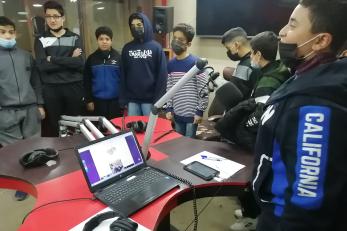Supporting Resilient Youth and Communities in Jordan – Impact Evaluation Report
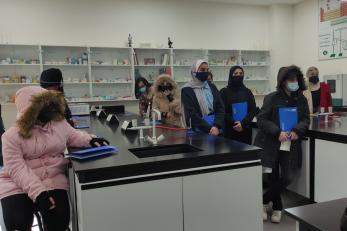
The impact evaluation report aims at assessing the “Nubader: Supporting Resilient Youth and Communities in Jordan - Phase II” Project (SRYJ II) and covers the performance period of December 2019 until April 2021. The purpose is to provide Mercy Corps and the Foreign, Commonwealth Development Office (FCDO) with strategic findings, conclusions and recommendations related to the effectiveness of project interventions and implementation approach for future programming.
The study results assess three key outcomes which are: enhanced wellbeing of at-risk youth; caregivers form better relationships with their children; and Community Action Hubs are able to respond to protection needs.
The evaluation process encompassed primary and secondary data collection. The primary data collection incorporated a mixed method of qualitative and quantitative data collection; the quantitative data was collected through pre and post evaluation structured questionnaires. As for the qualitative piece, Mercy Corps team collected the data through 16 Focus Group Discussions (FGDs) and three Key Informant Interviews (KIIs) across all project sites.
A key quantitative result for the first outcome reveals that when social and emotional learning (SEL) levels increase stress, aggression, and COVID‑19 stress levels decrease.
For the second outcome, one of the key quantitative results shows that the project’s interventions had a significant impact on parents’ relationship with their children. Results also reveal that the higher the knowledge of youth developmental needs, the better the parent-child relationship.
With reference to the third outcome, a key quantitative result reveals that the project’s intervention had a significant impact on enhancing community personnel’s Profound Stress and Attunement (PSA) knowledge.
The qualitative section of this impact evaluation provides more in-depth, holistic and multi-dimensional results and observations from all parties involved in the program including at-risk youth, parents/ caregivers, community personnel and Community Action Hub (CAH) managers.
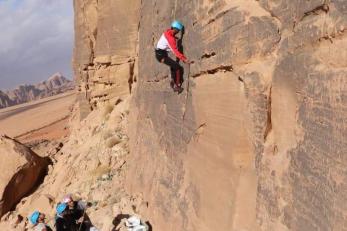
With reference qualitative key findings on at-risk youth, youth expressed that their participation in the program provided them with the skills to cope with stress and regulate their emotions when faced with challenging situations. Additionally, the interpersonal, self-expression, and life skills acquired through their engagement in the stations further enhanced their social and emotional awareness towards themselves and others around them, thereby encouraging them to be more proactive in their communities as well as changing their perception in relation to their future paths.
Under the second outcome’s results, participating parents reported a deeper understanding of youth developmental needs, an acquired set of parenting skills that enhanced their relationships with their children, and techniques to cope with stress. The program enabled parents to adopt parenting techniques that they employed as alternatives to violence and abuse. Furthermore, parents reported that understanding youth developmental needs coupled with learning healthy stress coping mechanisms enabled them to be more patient with their children, listen more often, and build healthy and open communication channels with their children. The program was found to be more effective with mothers who demonstrated a deeper understanding of youth developmental needs and were more effective in applying skills acquired.
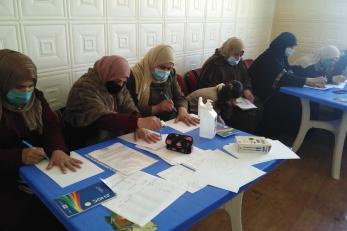
Under the third outcome’s results, community personnel working with Nubader have reported that the project has provided them with both the knowledge and experience to equip them and enrich their career paths and future endeavors. The foundation training is reported to be a very rich training workshop that enhanced community personnel’s awareness on tackled topics (stress coping mechanisms and brain development). The training helped them develop essential skills such as communication, decision making, prioritizing, anger management, and interpersonal skills.
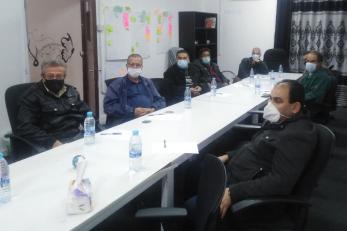
On the Comparison between SRYJ I and SRYJ II, qualitative results show that youth have gained additional skills sets that have not been reported on under SRYJ I. This could be attributed to the variety of stations that youth were exposed to solely under SRYJ II (community service, career exposure, and the camp station).
The impact evaluation finally provides recommendations from all parties affected by the program interventions. For instance, main youth recommendations include:
- Extend the length of the intervention to ensure that youth have enough time to reflect on each station before moving on to the next one and capture the maximum learning from them.
- Extend the length of the community service and career exposure sessions to increase youth’s exposure to multiple external learning, interaction in their communities, and new and healthy networks.
While main recommendations from parents include:
- Extend the length of the intervention to include more practical courses and content on early marriage, spouse relationships, and how to deal with the sexual needs of youth after puberty.
- Ensure the availability of joint parents-child activities to increase the impact on family relationships.
- Provide a larger amount of trainings for at-risk girls.
- Introduce self-expression sessions to the parenting manual.
